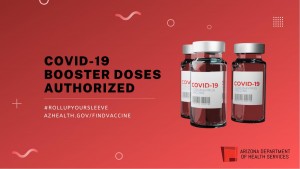E ven more Arizonans are eligible for booster doses of safe, free, and highly effective COVID-19 vaccine following today’s Centers for Disease Control and Prevention (CDC) announcement recommending boosters for 16- and 17-year-olds.
ven more Arizonans are eligible for booster doses of safe, free, and highly effective COVID-19 vaccine following today’s Centers for Disease Control and Prevention (CDC) announcement recommending boosters for 16- and 17-year-olds.
At this time, only the Pfizer booster is recommended for 16- and 17-year-olds, just as Pfizer is the only vaccine authorized for those younger than 18.
Today’s recommendation, which applies to those at least six months beyond their second Pfizer dose, comes a day after ADHS and Yavapai County reported the state’s first known case of the Omicron COVID-19 variant.
Much remains to be learned about Omicron, but to date vaccines have continued providing robust protection against other new variants, including Delta. In fact, we reported yesterday that in October people who weren’t vaccinated were 15.2 times more likely to die of COVID-19 than fully vaccinated individuals who contracted a rare breakthrough case. Those who weren’t vaccinated were almost four times more likely than the fully vaccinated to test positive for COVID-19.
We share the community’s concern about the impact that COVID-19 patients, the vast majority of whom aren’t vaccinated, currently are having on hospital capacity. Getting vaccinated and making sure you are up to date on your booster dose is one way we all can help make sure hospitals can provide care for all.
In addition to 16- and 17-year-olds, boosters are recommended for everyone 18 and older who is at least six months past their primary series of Pfizer or Moderna vaccine and at least two months beyond their Johnson & Johnson/Janssen shot.
Please find a provider at azhealth.gov/FindVaccine and get your COVID-19 vaccine or booster. You also can call the bilingual Arizona COVID-19 Hotline at 844.542.8201 (press 8 to be connected to a navigator) between 8 a.m. and 5 p.m. seven days a week.
In addition, we all can help preserve hospital capacity by:
- Getting a flu shot: azhealth.gov/Flu
- Masking up, maintaining physical distance, keeping hands washed, staying home if sick, and following other prevention steps: azhealth.gov/COVID-19
- Getting tested if you have symptoms or five to seven days after being exposed to someone who has or who you believe may have COVID-19: azhealth.gov/Testing
- If you or a loved one contracts COVID-19, looking into monoclonal antibody treatments that can reduce the severity of illness and reduce the chances of hospitalization: azhealth.gov/mAbs
More information on COVID-19 vaccines and boosters is available at azhealth.gov/COVID19Vaccines.










